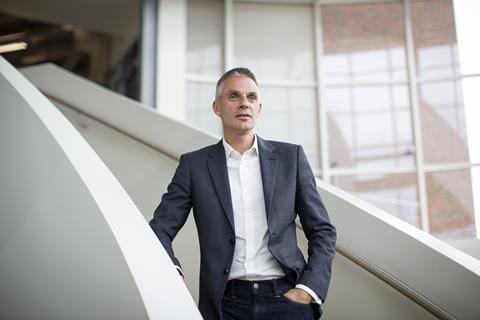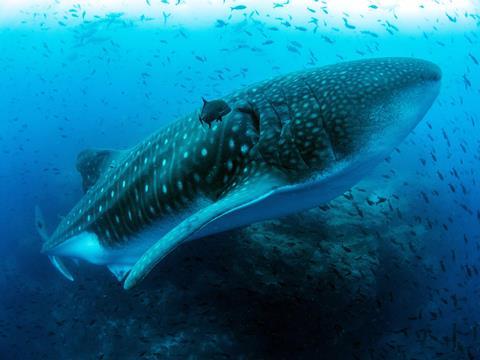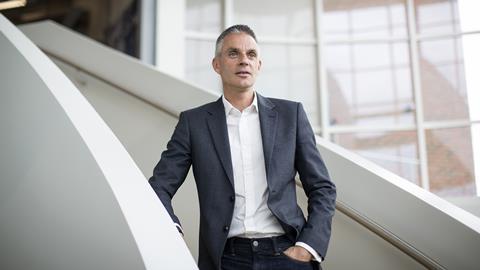BBC Studios Chief Executive Tim Davie on the need for talent, a ready supply of content and the importance of co-productions as scale becomes vital for broadcasters.
Tim Davie’s mantra is talent. The CEO of the newly enlarged BBC Studios has access to a lot of talent already, given that BBC Studios is home to statement shows from Strictly Come Dancing and Antiques Roadshow to Blue Planet II and EastEnders. But still, he’s not resting easy.

“Unless you have a supply of driven creative talent you’re vulnerable in this market,” says Davie, talking in a small glass-walled meeting room at BBC Studios HQ, next door to the recently revamped Television Centre in West London.
“There has been a fundamental transformation in where the control sits in the industry and it’s profound. If you are running a business like ours, the challenge is very clear: it’s around how you secure a content pipeline, because in every market scenario this is where the true value of our business sits.”
The market for making and distributing content is certainly going through a sea change at the moment; every CEO in the business formerly known as broadcasting is feeling the heat.
The merger of BBC Worldwide, the BBC’s commercial distribution business, with its in-house production unit to create BBC Studios in April of this year is a big part of the BBC’s plan to create a scale-player in a demanding and increasingly competitive market for production, sales and distribution. Davie, who was appointed CEO of BBC Worldwide in 2013, took the new top job, with the former head of BBC Studios Mark Linsey becoming chief creative officer of the new, merged entity.
Even with the potential that under revised competition rules some shows will be open to competitive bidding from the likes of ITV Studios and FremantleMedia, BBC Studios is still a powerhouse of creative productions. Last year it produced 2000 hours of content. BBC Studios counts 3000 staff, has offices in 22 countries, including six production bases in the UK. New production hubs were set up in both Sydney, Australia and Beijing, China earlier this year. In 2016-17 the commercial activities of the BBC, led by BBC Studios commercial unit which sells shows like Doctor Who in markets worldwide, generated £1.2 billion in revenue, according to a recent National Audit Office report.
Another report, prepared by consultancy Mediatique, suggests spending on British programming could fall in real terms by £500 million over the next ten years as global players like Facebook, Amazon, Apple, Netflix and Google, collectively referred to as FAANG, write big cheques to make shows that appeal to global audiences. The BBC’s director general Tony Hall sounded an alarm that this trend poses a “real risk “to the volume and breadth of British content that will be available in the future.
Davie is taking the threat to heart. He believes that the merger to create BBC Studios is a “natural evolution”. The two entities were already working together to fund signature series like Blue Planet II, which was produced by BBC Studios but was more than three-quarters funded by BBC Worldwide and several partners brought in by Davie, including, among others, Chinese internet giant Tencent.

Combining the BBC’s distribution and production businesses allows the BBC to have more “holistic conversations” with customers and partners, says Davie. “Our landmark deal with Tencent was about co-production but it also included the creation of short-form content for their platform. So suddenly you’re having a conversation not just about programme acquisition for a particular market but about product, local exploitation and ancillary revenues.
“We are seeing an evolution in our business and that really makes sense, particularly as scale becomes more defining,” he continues. “Being able to work across the whole value chain from production to exploitation is important because in this market we need to be fleet of foot and responding rapidly to the changes. It’s about being able to re-set yourself, so you are benefitting from the winds of change rather than just being buffeted by them.”
BBC Studios helps make the BBC a big enough player to sit at the same table as the FAANGs, but Davie is keen to add more to his talent arsenal. This includes both nurturing new talent coming up through the BBC as well as buying independent producers – as of the beginning of July 2018, the BBC had stakes in 17 such firms.
“What we’ve done recently is not only about the integration with BBC Studios, it’s also about expanding our base of partnerships with independent producers,” explains Davie, and it’s clear that there are more to come.
“If you look at my average day this is an ideas-driven business, so you can do all the strategy charts you like but at the end of the day it’s driven by people with ideas. My job is simply about attracting the best talent into the organisation. Everything becomes secondary to that.”
‘The challenge is very clear: it’s around how you secure a content pipeline, because in every market scenario this is where the true value of our business sits’
Sharp competition
In the hyper competitive world of talent and programme production and distribution, the BBC is fighting back: Earlier this year, the BBC increased its stake to 48% in scripted producer Clerkenwell Films, the maker of the E4 and Netflix award-winning series End of the F***ing World and Misfits. “Globally we are a company where the key skill is around partnerships,” says Davie.
Upcoming show Good Omens underscores the point well: it’s a six-part comedy/horror written by Neil Gaiman and based on the book by himself and Terry Pratchett. It is being made in partnership with Amazon, to be screened on Amazon’s Prime Video in the UK and 200 other countries globally; it will only air on BBC2 a later date. The rights to distribute the series globally will revert to BBC Studios after the premiere on Prime Video. “I don’t have a single model here that we are working to,” says Davie. “You have to look at it on a project-by-project basis.”
Davie is also keen to leverage the growth in audience appetite for on-demand services both in the UK with iPlayer and outside the UK with BritBox, a joint subscription VoD service with ITV and AMC. Clearly, outside the UK, Davie sees the latter as a key part of BBC Studios’ tool box to attract talent to work with BBC Studios. For example, BritBox recently joined with a number of broadcasters, including the BBC, to co-produce a 10-part crime drama set in Spain from the writer behind The Good Karma Hospital. The new series has the working title The Mallorca Files and is being made by Clerkenwell Films.
There are also reports that the BBC is interested in leveraging its stake in UKTV, the niche linear and on-demand channel provider. UK regulator Ofcom has encouraged the UK’s public service broadcasters to work together on VoD, perhaps by joining together in a commercialised, on-demand service for their content after it has aired on their own catch-up services. Davie won’t be drawn on this or on specific plans for UKTV.
“There are massive opportunities for streaming and on demand services,” he says. “Those with the right scale and the right content, plus the ability to deliver flawless, cut-through experiences for consumers – and credit to companies like Netflix and Amazon for doing that.”
Davie believes that the future success of OTT streaming and on-demand services are about balancing good content with a “ruthless focus” on functionality and product. “The truth is that this OTT market is still evolving, and I think there are still great opportunities for growth for those who really understand their audience and what they are passionate about,” he adds.
Davie is working in a market of global giants, but he believes the BBC has an edge because of its editorial and creative point of view. “I think it’s really important that a business like ours is infused with an editorial sensibility,” says Davie. “More than anything we want the great work to happen and that often requires us to have partnership conversations.”
“I’m not naive about it,” he adds. “There will be times when we are fighting over talent but more often than not this is about making projects work through partnerships, and part of that is about ensuring the health of our biggest customer, which is the BBC public service and the iPlayer.”
IBC2018 Tim Davie will deliver the IBC Opening Keynote Cutting Through: How BBC Studios views the new world of content on Thursday 13 September.




























No comments yet